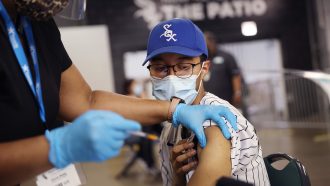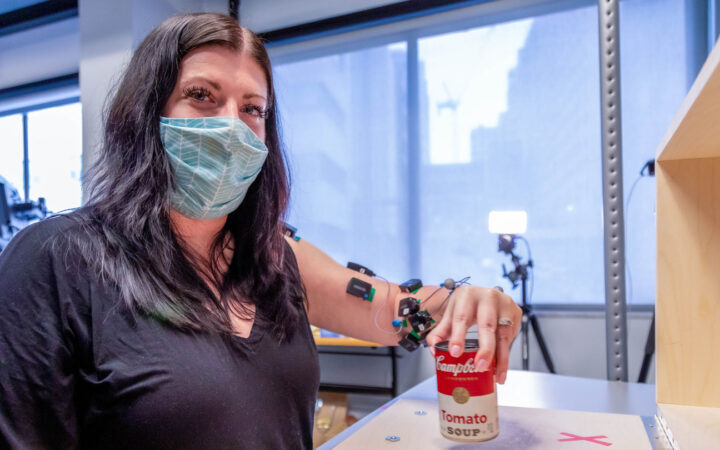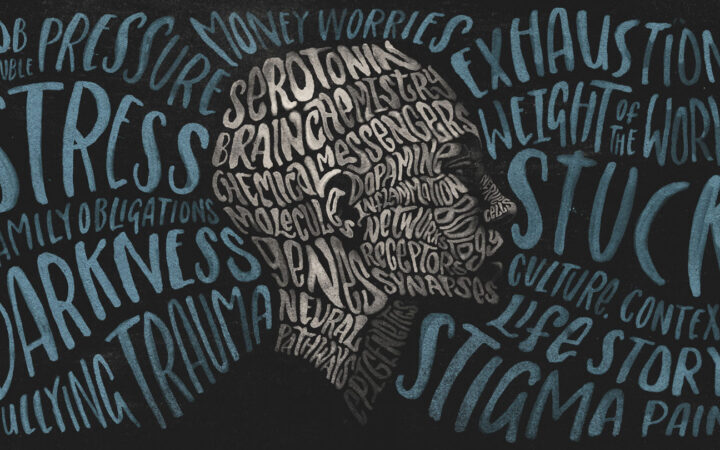
U.S. health officials will add a warning that the mRNA vaccines against COVID-19 could possibly cause rare cases of heart inflammation.
The largest-yet review of cases found a higher-than-expected incidence of the side effect, particularly in teen and young adult males. But the risk of the easily treatable heart issue is low and outweighed by the benefits of vaccination, Sara Oliver of the Centers for Disease Control and Prevention said June 23 after a presentation of the risks and protections offered by the mRNA vaccines made by Moderna and Pfizer/BioNTech.
Sign up for e-mail updates on the latest coronavirus news and research
For instance, the data show that for every million second doses of vaccine given to boys ages 12 to 17, about 56 to 69 cases of heart inflammation are expected to arise. That makes them the group most at risk of the side effect. But the shots could shield the boys from 5,700 cases of COVID-19 and its complications, including 215 hospitalizations, 71 intensive care admissions and two deaths. Girls in that age group have a much lower risk — 8 to 10 instances per 1 million second doses — but vaccination could avert 8,500 cases of COVID-19, 183 hospitalizations, 38 ICU admissions and one death.
Vaccination may also prevent long-term symptoms, and a hyper-inflammatory condition called MIS-C, which strikes an estimated 1 of every 3,200 children infected with SARS-CoV-2 (SN: 5/12/20).
The decision to add a warning came after the CDC’s Advisory Committee on Immunization Practices discussed cases of two kinds of heart inflammation among young people shortly after they got vaccinated: myocarditis, or inflammation of the heart muscle, and pericarditis, inflammation of the lining of the heart. The possible side effects were first noticed in Israel, but other countries, including the United States, have found cases of the heart problems, too.
Viral infections, including coronavirus infections, may cause the heart inflammation as a side effect of the immune system’s efforts to fight the virus (SN: 6/1/21). Because vaccines also stir up the immune system, some vaccines have also been linked to heart inflammation.
As of June 11, after 133 million second mRNA vaccine doses, 636 cases of myocarditis had been reported to VAERS, a U.S. database to which anyone can report side effects, regardless of whether those side effects are caused by a vaccine. The CDC used those data and others to calculate potential harms and benefits of getting an mRNA vaccine.
Based on how many cases of myocarditis and pericarditis that would be expected in young people, the number of reported cases was higher than expected for 12- to 39-year-olds, the researchers found. Males were more likely than females to develop heart inflammation, and the issue arose more often after the second dose of vaccine than after the first dose. And the effect was more obvious in younger people, said Tom Shimabukuro of the CDC’s COVID-19 vaccine task force. “This effect largely disappears when you get into these older age groups, individuals 50 and older,” he said.
Overall, 12.6 cases of heart inflammation were found for every million second dose of an mRNA vaccine given to 12- to 39-year-olds, Shimabukuro reported. Moderna’s vaccine was associated with 19.8 cases per million second doses, while Pfizer’s vaccine was linked to 8 cases per million second doses in those age groups.
Why the Moderna vaccine would produce more cases of heart inflammation than the Pfizer vaccine is not clear. Moderna’s vaccine is currently authorized for people 18 and older, so any myocarditis or pericarditis cases noted in 12- to 17-year-olds are mostly from the Pfizer vaccine or from clinical trials in teens and tweens.
But the benefits still trump the risk, the CDC’s Megan Wallace reported. Even as overall cases of COVID-19 are declining in the United States, the share cases in younger people is growing. In May, about a third were among 12- to 29-year-olds.
While young people are less likely to have severe disease and die of COVID-19 than older people, they may still get very ill, suffer serious complications and even die. Since the beginning of the pandemic, 2,767 people in the United States 12- to 29-years-old have died of COVID-19. That includes 316 deaths in that age group since April 1.
Besides the findings for 12- to 17-year-olds, the analysis also showed that for every million second doses of vaccine given to 18- to 24-year-olds, officials expect four to five cases of myocarditis in females and 45 to 56 cases among males. In that age group, vaccination is expected to prevent:
14,000 cases of COVID-19 in females and 12,000 cases in males;1,127 hospitalizations for females and 530 for males;93 intensive care admissions for females and 127 for males;and 13 deaths among women and three for men.
In the older age group, the benefit becomes even more clear. Two cases of myocarditis in women and 15 to 18 cases in men ages 24- to 29-years old are expected for every million second doses of an mRNA vaccine given. But the vaccines could prevent:
15,000 cases of COVID-19 in females and an equal number in males;1,459 hospitalizations of females and 936 of males;87 intensive care admissions in females and 215 in males;and four deaths in females and 13 deaths in males.
Those calculations could change if there is a dramatic decline or rise in cases, Wallace said. But as a result of the data, officials from CDC and the Food and Drug Administration said they would continue to recommend vaccination against COVID-19 for young people.

 A new treatment could restore some mobility in people paralyzed by strokes
A new treatment could restore some mobility in people paralyzed by strokes  What has Perseverance found in two years on Mars?
What has Perseverance found in two years on Mars?  This robot automatically tucks its limbs to squeeze through spaces
This robot automatically tucks its limbs to squeeze through spaces  Greta Thunberg’s new book urges the world to take climate action now
Greta Thunberg’s new book urges the world to take climate action now  Glassy eyes may help young crustaceans hide from predators in plain sight
Glassy eyes may help young crustaceans hide from predators in plain sight  A chemical imbalance doesn’t explain depression. So what does?
A chemical imbalance doesn’t explain depression. So what does?